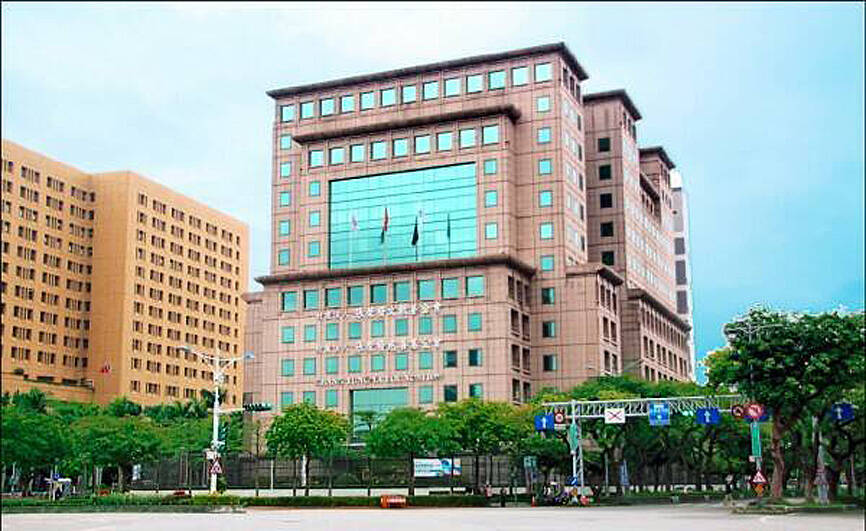The Taipei High Administrative Court yesterday ruled in favor of the Chinese Nationalist Party (KMT), saying it need not pay the state the more than NT$1 billion (US$31.43 million at the current exchange rate) it made from the sale of its old party headquarters in downtown Taipei.
Yesterday’s ruling was a reversal of a decision by the same court in 2021, which stemmed from a lawsuit filed by the KMT in 2018 against the government’s Ill-gotten Party Assets Settlement Committee.
The ruling can still be appealed.

Photo: Taipei Times file
The court said the committee must withdraw its 2018 administrative order demanding that the KMT hand over the NT$1.14 billion it made from the property sale.
The KMT in March 2006 sold the site to Chang Yung-fa Foundation for NT$2.3 billion.
Set up in 2016, the committee evaluated historical records to verify that the KMT had rented the property to house its old party headquarters.
The building housed the International Red Cross during the Japanese colonial era.
Records show that after World War II, the then-KMT government placed the building under the Ministry of Finance’s National Property Administration and started renting it for its party headquarters in 1967.
When the lease expired in 1971, it did not renew the contract, but continued using the office building until it signed a new lease in 1983.
The KMT later applied and in 1990 received approval to purchase the property, for which it paid NT$77.12 million.
The KMT rebuilt the headquarters building in 1994 in preparation to sell, mainly due to pressure from former president Chen Shui-bian (陳水扁) of the Democratic Progressive Party (DPP), who served as a legislator from 1990 to 1994, and as Taipei mayor from 1994 to 1998.
During his election campaigns in the early 1990s, Chen hammered the KMT with accusations of “illegally occupying” the property and promised voters that if elected, he would use the authority of the government to tear it down and force the KMT off the property.
The KMT lost in the court’s first ruling in May 2021, with the Taipei High Administrative Court deeming the property an “ill-gotten party asset” and that the party obtained ownership through illegal means.
In a separate ruling yesterday, the Taipei High Administrative Court ruled in favor of Broadcasting Corp of China (BCC), saying that the committee’s declaration of the company as a KMT affiliate was incorrect.
The ruling stemmed from a lawsuit filed by the BCC after the committee in 2019 deemed it an affiliate of the KMT and ordered it to relinquish 109,627m2 of land to the state and pay NT$7.731 billion.
Yesterday’s ruling can still be appealed.
The committee said it would appeal both rulings.

A preclearance service to facilitate entry for people traveling to select airports in Japan would be available from Thursday next week to Feb. 25 at Taiwan Taoyuan International Airport, Taoyuan International Airport Corp (TIAC) said on Tuesday. The service was first made available to Taiwanese travelers throughout the winter vacation of 2024 and during the Lunar New Year holiday. In addition to flights to the Japanese cities of Hakodate, Asahikawa, Akita, Sendai, Niigata, Okayama, Takamatsu, Kumamoto and Kagoshima, the service would be available to travelers to Kobe and Oita. The service can be accessed by passengers of 15 flight routes operated by

MORE FALL: An investigation into one of Xi’s key cronies, part of a broader ‘anti-corruption’ drive, indicates that he might have a deep distrust in the military, an expert said China’s latest military purge underscores systemic risks in its shift from collective leadership to sole rule under Chinese President Xi Jinping (習近平), and could disrupt its chain of command and military capabilities, a national security official said yesterday. If decisionmaking within the Chinese Communist Party has become “irrational” under one-man rule, the Taiwan Strait and the regional situation must be approached with extreme caution, given unforeseen risks, they added. The anonymous official made the remarks as China’s Central Military Commission Vice Chairman Zhang Youxia (張又俠) and Joint Staff Department Chief of Staff Liu Zhenli (劉振立) were reportedly being investigated for suspected “serious

ENHANCING EFFICIENCY: The apron can accommodate 16 airplanes overnight at Taoyuan airport while work on the third runway continues, the transport minister said A new temporary overnight parking apron at Taiwan Taoyuan International Airport is to start operating on Friday next week to boost operational efficiency while the third runway is being constructed, the Ministry of Transportation and Communications said yesterday. The apron — one of the crucial projects in the construction of the third runway — can accommodate 16 aircraft overnight at the nation’s largest international airport, Minister of Transportation and Communications Chen Shih-kai (陳世凱) told reporters while inspecting the new facility yesterday morning. Aside from providing the airport operator with greater flexibility in aircraft parking during the third runway construction,

American climber Alex Honnold is to attempt a free climb of Taipei 101 today at 9am, with traffic closures around the skyscraper. To accommodate the climb attempt and filming, the Taipei Department of Transportation said traffic controls would be enforced around the Taipei 101 area. If weather conditions delay the climb, the restrictions would be pushed back to tomorrow. Traffic controls would be in place today from 7am to 11am around the Taipei 101 area, the department said. Songzhi Road would be fully closed in both directions between Songlian Road and Xinyi Road Sec 5, it said, adding that bidirectional traffic controls would